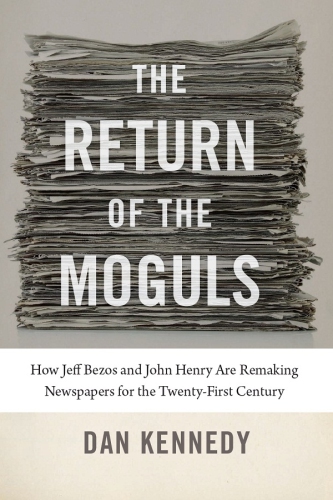
The Return of the Moguls
How Jeff Bezos and John Henry Are Remaking Newspapers for the Twenty-First Century
- اطلاعات
- نقد و بررسی
- دیدگاه کاربران
نقد و بررسی

January 29, 2018
Kennedy (The Wired City) collects insights from case studies of three American newspapers, arguing that wealthy, civic-minded owners are key to the survival of newspapers in America. Focusing on the Washington Post under the leadership of Amazon founder Jeff Bezos, the Boston Globe under Red Sox owner John Henry, and California’s Orange County Register under entrepreneur Aaron Kushner, Kennedy looks at what led to the sale of each paper between the years 2012 and 2013 and the vitality of the businesses in the years since. The goal of all three organizations was to transition to a subscription revenue model, but the companies differed in their approaches. The Post under Bezos expanded national news coverage in an effort to amass a larger online audience, a portion of which pays for access and has made the paper the most successful venture of the three. At the other end of the spectrum is the Register under Kushner, who resigned as CEO in 2015 after financial trouble stymied his plan to develop the print newspaper. Much of the book chronicles the industry’s long and painful transition from print to online in the decades prior to the sale of each paper, and the narrative tends to get overloaded with digital jargon, focusing on minutiae such as how websites measure clicks for advertisers. The conclusions Kennedy draws (“the lesson... is there is no lesson”) are neither definitive nor terribly optimistic. The book reads more like a chronicle of the death of daily newspapers than a glimpse into their possible future.

March 1, 2018
Kennedy (journalism, Northeastern Univ.; The Wired City) ably documents financial stresses on newspapers and offers an insider's perspective of the industry's past and future. With the advent of the Internet, newspapers faced financial and journalistic challenges that remain unresolved. Early on, papers posted content online for free--a decision that continues to decimate the bottom line, as customers resist subscribing to publications without user-friendly, digital platforms. Kennedy maintains that the newspaper mogul, a modern-day William Randolph Hearst, may be the salvation of the industry, but often is not. With deep pockets to offset the decline in ad revenue, the moguls wrestle with strategies to maintain journalism's "custodial" role in a world of fake news. Aligning with nonprofits is an ongoing experiment of papers in Philadelphia and Burlington, VT. The author maintains that Washington Post owner Jeff Bezos offers the best hope for survival of investigative, quality journalism in a digital world. VERDICT This analytical and predictive book will be of equal interest to lifetime consumers of printed news as well those more familiar with digital platforms.--John Muller, Washington, DC, P.L.
Copyright 2018 Library Journal, LLC Used with permission.

January 15, 2018
A veteran media critic finds signs of hope as civic-minded billionaires do their best to revive newspapers.Though the subtitle only mentions two moguls, the analysis devotes equal attention to three. Kennedy (Journalism/Northeastern Univ.; The Wired City: Reimagining Journalism and Civic Life in the Post-Newspaper Age, 2013) has been developing sources since he was a media watchdog for the alt-weekly Boston Phoenix, now defunct, and he knows that much conventional wisdom concerning the plight of newspapers misses the mark. He debunks the notion that newspapers were late to the internet game, showing just how early the leading ones jumped onboard. The problem is that newspaper sites offered content for free while charging for print. This wasn't an issue when sites were so slow to load and few readers were accessing the internet for news, but it has since resulted in a broken business model, particularly since advertisers have fled print for the web, and the classifieds have largely gone to Craigslist. Though "moguls" often carries a negative connotation, Kennedy understands how publically traded corporations have decimated their newsrooms in the chase for profits, and many welcome the wealth of Amazon's Jeff Bezos and Boston Red Sox owner John Henry as they try to keep the newspapers they bought (the Washington Post and Boston Globe respectively) afloat. As a cautionary tale, the author offers Aaron Kushner and the Orange County Register, which he attempted to revive with an emphasis on print but whose accelerated timetable showed how much more difficult the challenge can be with a comparative lack of resources. The answer, Kennedy suggests, lies not merely in moguls, but in the right moguls, ones who are committed to quality journalism as the key ingredient and who recognize that necessary risks might lead to costly mistakes. Though Bezos refused to make himself available, the author sees him as someone doing things right for the right reasons--an assertion sure to meet with rigorous arguments.In a book whose conclusions will be debated, Kennedy rightly suggests that quality journalism is not only salvageable, but necessary.
COPYRIGHT(2018) Kirkus Reviews, ALL RIGHTS RESERVED.




دیدگاه کاربران